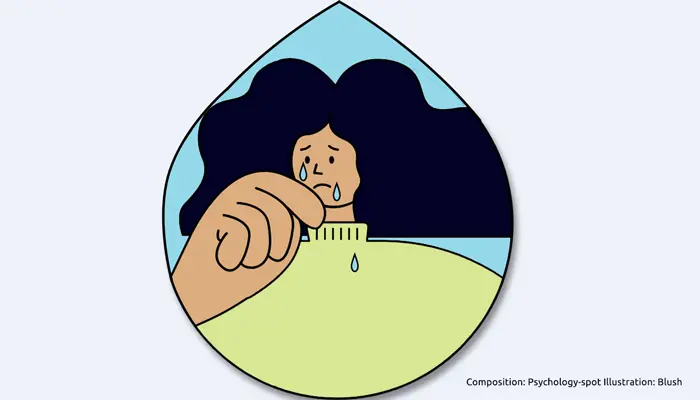
“Wanting to be happy every day is a disease”, said Zygmunt Bauman. Sadness and joy are two sides of the same coin, and both are necessary to lead a full life. There can not be one without the other. But we don’t understand it. Or we don’t want to understand it.
We have classified sadness as a “negative” emotion. And being negative we want to get rid of it as soon as possible. We resist being sad. We worry because we are sad. We are saddened even more by being sad. And so we fall into a loop that ends up worsening our mood.
The dictatorship of happiness makes us unhappy
In 2018, a group of psychologists from the University of New South Wales conducted a series of experiments to determine how the social expectation of happiness affects us, especially when we face failure.
In one of the experiments, participants faced tests that were designed to fail. One group was told that they were unlikely to be able to solve the problems. Another group was in a “happy room” with motivational posters and cheery notes taped to the walls. And a third group was in a neutral room, they were not told anything about their possible performance.
Psychologists found that people in the “happy room” were much more concerned with their failure. “When people are in a context where happiness is highly valued, it creates a sense of pressure that they should feel that way”, the researchers explained. As a result, when they experience failure, they begin to ruminate and reject negative feelings. That makes them feel even worse.
They also found that when we think that society expects us not to feel sad and to be always happy, we experience more frequently negative emotional states marked by stress, anxiety and sadness.
It is not by chance that a person who lives in a western country and shares its culture is 4 to 10 times more likely to develop clinical depression or anxiety throughout his life than a person of an Eastern culture. In China and Japan the emotions that we classify as negative and positive are seen as essential parts of life. There is no constant pressure to feel joyful and happy all the time.
In fact, the Buddhist philosophy that permeates Eastern culture requires recognizing all emotions and embracing sadness and pain as part of the human condition. Instead of running away from sadness, it emphasizes the need to understand its nature and learn to live with that feeling.
It’s not what you feel, it’s the meaning you give to it
In 2016 psychologists from Colorado State University, Johannes Gutenberg University of Mainz and the Max-Planck Institute for Human Development developed another very interesting experiment that debunked some of the beliefs that we often take for granted on an emotional level.
They recruited 365 people and did six daily tests on their emotional health over a three-week period. They noted their emotional states, their physical health and the degree of well-being and satisfaction.
They found that there is no direct link between emotional states considered negative and poorer physical health, less well-being, or dissatisfaction with life. However, people who classified these feelings as adverse did report feeling worse, both physically and emotionally.
This indicates that it is not the aversive experiences in themselves that can harm us, but the meaning that we entrust to them. Sadness is not intrinsically negative, it depends on how we live and assume it.
The benefits of occasional sadness
To embrace sadness we must claim its role in our emotional universe. In fact, sadness encourages personal reflection after a loss. It is a rite of passage that helps us update our mental schemes to accept the loss and move on.
It also helps us to be more empathetic. A study at Queen’s University revealed that sadder people were better able to detect the emotions of others as they are often more sensitive to small extraverbal cues. In turn, sadness allows us to strengthen ties with the others and receive the help we need at that time since it generates sympathy in others.
Interestingly, sadness also helps us find better arguments and be more persuasive. In fact, occasional sadness encourages critical thinking, helping us see things from a perspective that can be much more objective since it takes us away from the optimistic bias we usually have.
Sadness also helps us detect lies and be less gullible, so we are not so easily fooled and we are more accurate in detecting false data, as found psychologists from the University of Illinois.
Accepting sadness is not optional if you want to feel good
For a long time, society has sent us a clear message: There are negative emotions that we must get rid of as soon as possible. Therefore, when we experience them we worry and put into practice all kinds of maladaptive strategies to make them disappear, from avoidance to suppression and denial.
Accepting sadness, on the other hand, will free us from that pressure. When we strive to avoid sadness at all costs and see it as a problem, we will not be happy, but instead condemn ourselves to a loop of dissatisfaction.
We must understand that each emotion has its reason for being, so instead of rejecting sadness, we need to understand its cause and the message it wants to convey to us. We can even go a step further and embrace sadness, which implies not resigning ourselves to its presence, as if it were a necessary evil of which we are prisoners, but welcoming it with open arms, as we do with joy or happiness.
That hug can be as long as we decide. Embracing sadness will give us the opportunity to make peace with pain, suffering, loss and failure. That hug comforts the soul because it allows us to recognize our humanity. And, in the long run, it returns our balance.
Sources:
Bastian, B. et. Al. (2018) Does a Culture of Happiness Increase Rumination Over Failure? Emotion; 18(5): 755-764.
Dejonckheere, E. et. Al. (2017) Perceiving Social Pressure Not to Feel Negative Predicts Depressive Symptoms in Daily Life. Depress Anxiety; 34(9): 836-844.
Luong, G. et. Al. (2016) When bad moods may not be so bad: Valuing negative affect is associated with weakened affect–health links. Emotion; 16(3): 387–401.
Harkness, K.L. et. Al. (2005) Enhanced accuracy of mental state decoding in dysphoric college students. Cognition and Emotion; 19: 999-1025.
Forgas, J. P. et. Al. (2005) Mood effects on eyewitness memory: Affective influences on susceptibility to misinformation. Journal of Experimental Social Psychology; 41(6): 574-588.



